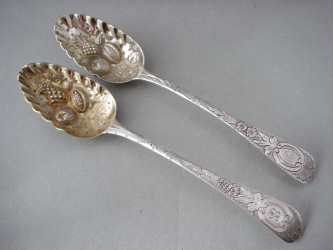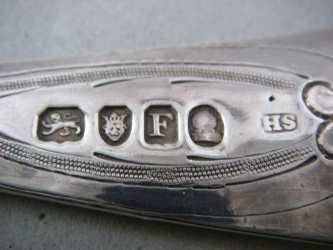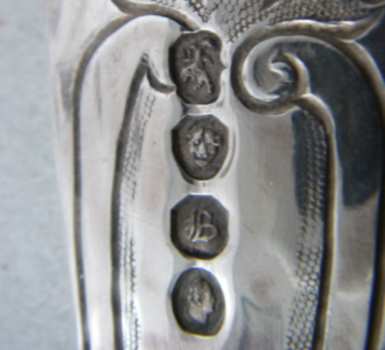by
Christine Erratt
|
(click on images to enlarge)
TAKE TIME WHEN DATING HALLMARKS
At a recent small auction I was fortunate enough to be the
only interested bidder in a pair of English berry spoons. The
auctioneer's description in the catalogue was inadequate and
inaccurate, describing both as Victorian. After examining them
and their marks at the preview I rushed home to consult my
reference books.
The first spoon was made by Solomon Hougham in the Georgian era
and marked London 1801. Nothing particularly unusual about this
ornate berry spoon with its gilded bowl. According to most
sources, it is considered that many old plain spoons were
converted into fancy berry spoons in the Victorian era - a
whimsical use, perhaps, for one's old-fashioned flatware.
The second spoon held a hidden delight! The maker's mark, WE
in cameo within a bi-lobar lozenge, was easy to identify as that
of William Eaton. The assay office - also easy to identify -
London - and the date letter 'B' for 1837.
IF I had used only a small reference book for identifying the
date, the search would have finished there and then. However, my
'bible', Jackson's Silver & Gold Marks of England, Scotland &
Ireland told me more information.
This mark could be narrowed down to have been applied to the
spoon between 29 May and 20 June 1837 - a mere 23 days. The last
day of the year marking for the William lV era 1836-1837 was 28
May 1837. On 29 May 1837 the lettering for the next 12 months
began, with B being used. However, William lV died on 20 June
1837 so a new monarch's head, namely the head of Queen Victoria,
had to commence the next day.
My spoon has William lV's head and the year letter B, making it
identifiable as fitting into this small window of time.
I suggest that not a particularly great number of silver items
would have been hallmarked in this short space of time. Along
with its beauty and craftsmanship, it is a bargain that I really
appreciate... and delightful to use when serving berries for
dessert.
|
Christine Erratt
- 2014 -
|
|



